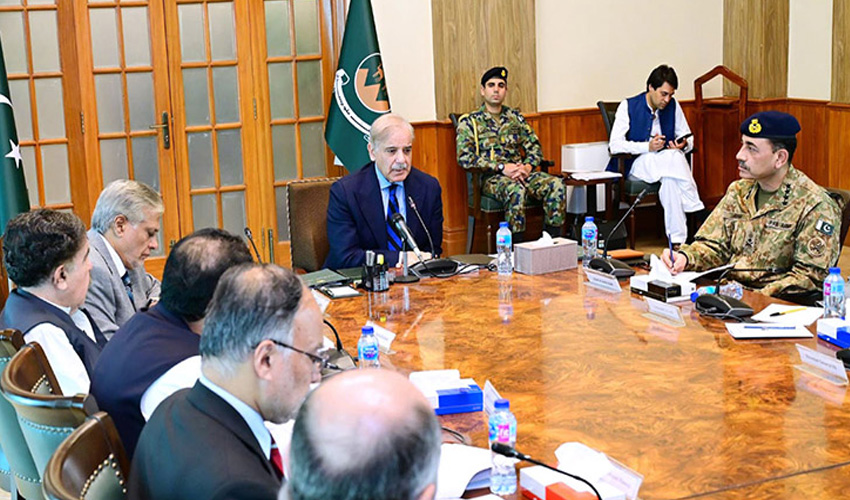ISLAMABAD: In a strong warning, the National Security Committee (NSC) of Pakistan declared that any move by India to block or divert Pakistan’s water will be treated as an act of war. The NSC issued this statement after a high-level civil-military meeting chaired by Prime Minister Shehbaz Sharif on Thursday.
The top leadership rejected India’s unilateral decision to suspend the Indus Waters Treaty. The NSC emphasized that this agreement is vital for regional peace. It also stated that water is a core national interest and a lifeline for the 240 million people of Pakistan.
The committee declared that any attempt to stop or divert water flow that rightfully belongs to Pakistan will be viewed as a declaration of war. According to the NSC, Pakistan remains firm in protecting its water rights under all circumstances.
The situation escalated after India, under Prime Minister Modi’s leadership, suspended the Indus Waters Treaty. India also imposed a travel ban on Pakistani nationals after 26 Indian tourists were killed in Pahalgam, a region in Indian Illegally Occupied Jammu and Kashmir (IIOJK).
In an immediate response, Pakistan decided to limit Indian diplomatic staff in Islamabad to 30, effective April 30. Furthermore, Pakistan shut down its airspace to all Indian-owned or Indian-operated flights.
Pakistan has also cut off all trade with India, including indirect trade through third countries. The government ordered the closure of the Wagah Border crossing with immediate effect.
The NSC vowed a strong response to India’s aggressive steps. It said Pakistan’s armed forces are ready to defend the nation against any kind of hostility. The statement underlined that India’s hostile actions have proven the relevance of the Two-Nation Theory and confirmed Quaid-e-Azam Muhammad Ali Jinnah’s fears.
Despite the rising tensions, the NSC said Pakistan is still committed to peace.
India’s Ministry of External Affairs has taken five actions, calling them a “decisive response to cross-border terrorism.” One of the actions includes the closure of the Attari Integrated Check Post. India has also asked all Pakistani nationals to leave the country by May 1, 2025.
India canceled all SAARC Visa Exemption Scheme (SVES) visas issued to Pakistanis. Pakistanis already in India under SVES visas were told to leave within 48 hours.
India also declared Pakistan’s military, naval, and air advisers in New Delhi persona non grata. They were given one week to leave. India also announced it would recall its defence officials from Islamabad. It plans to reduce the staff of its High Commission in Pakistan from 55 to 30 by May 1.
Defence Minister Khawaja Asif addressed the matter on a private TV channel. He said India cannot withdraw from the Indus Waters Treaty on its own. He explained that the treaty includes other stakeholders like the World Bank.
Asif added that India has long wanted to end the water-sharing pact, but Pakistan is ready to defend its rights with full force. He made it clear that Pakistan rejects all forms of terrorism.
Speaking to media separately, the minister said that Pakistan had nothing to do with the Pahalgam attack. He stated that insurgencies are happening all over India, from Nagaland to Manipur and Chhattisgarh. These are local uprisings against the Indian government, not cross-border terrorism, he argued.
He urged India to investigate the incident properly instead of blaming Pakistan. He called the accusations against Pakistan baseless. He warned that a false flag operation cannot be ruled out.
This concern was echoed by defence analysts and former senator Mushahid Hussain Syed. The veteran diplomat criticized India for blaming Pakistan without proof every time an incident occurs in India or IIOJK. He highlighted how Indian media promotes war rhetoric and fuels anti-Pakistan sentiment online.
After the Pahalgam incident, India also blocked the official X (formerly Twitter) account of the Government of Pakistan. The account was restricted in India due to a legal notice.
Meanwhile, Shazia Marri, spokesperson for the Pakistan Peoples Party Parliamentarians (PPPP), strongly condemned the Pahalgam killings and India’s reaction. She said India should end its “Pakistan phobia” and respect international laws and diplomatic norms.
She reminded India that Pakistan recently welcomed over 6,700 Sikh pilgrims with open arms. Marri said India is using propaganda to hide its own failures. She criticized the Modi government for spreading hate and oppressing Kashmiris.
She urged India to look inward and fix its own security issues. Marri made it clear that Pakistan is a powerful and responsible country. She said Pakistan knows how to defend itself against aggression.
The Indus Waters Treaty, signed in 1960, is a crucial water-sharing pact between India and Pakistan. Brokered by the World Bank, it grants Pakistan control over the western rivers—Indus, Jhelum, and Chenab—and gives India rights to the eastern rivers—Ravi, Beas, and Sutlej. The treaty has survived multiple wars, but the current standoff poses a serious threat to its survival.
This latest escalation could destabilize the region further if both nations do not pull back from confrontation. Yet, Pakistan remains firm in its stand that the Indus Waters Treaty is not just a legal contract—it is a matter of national survival.


